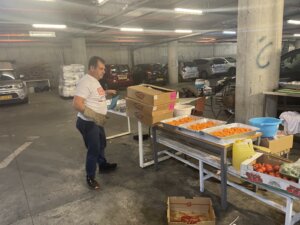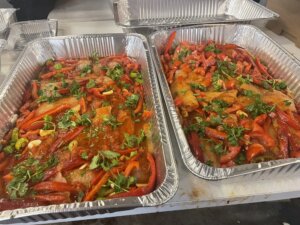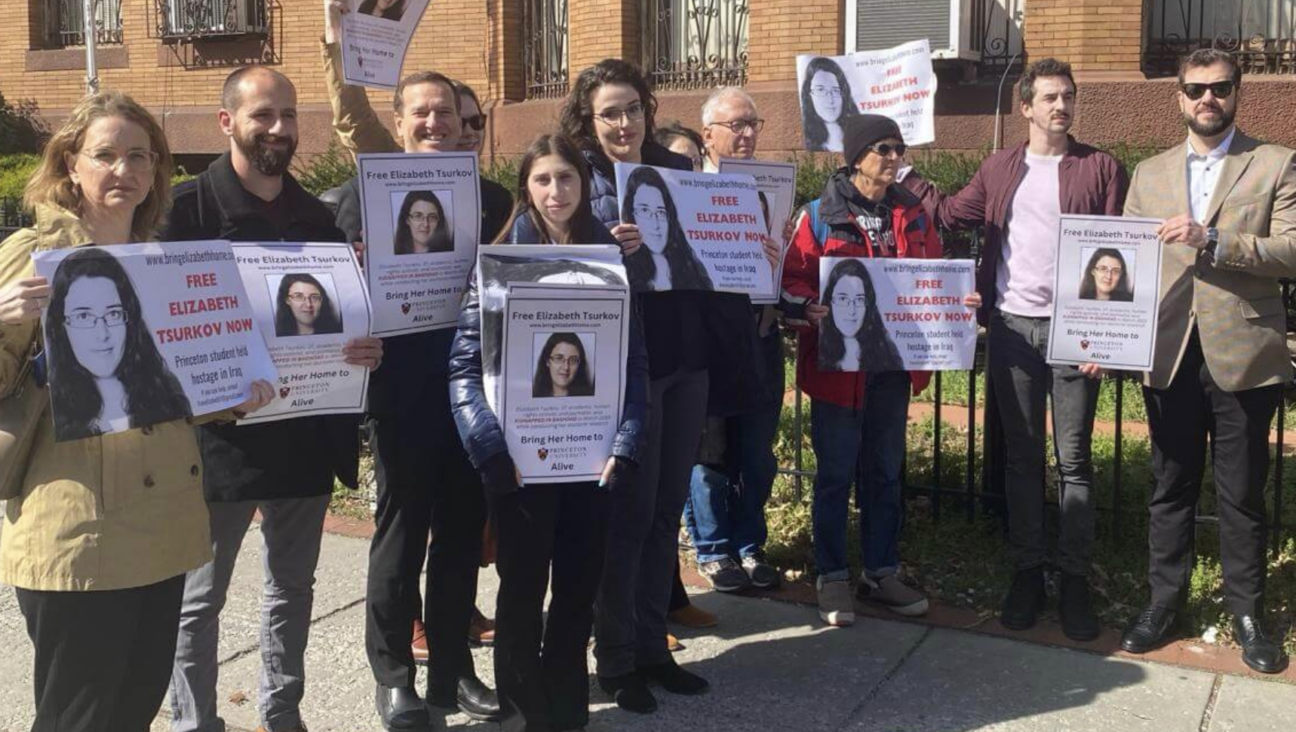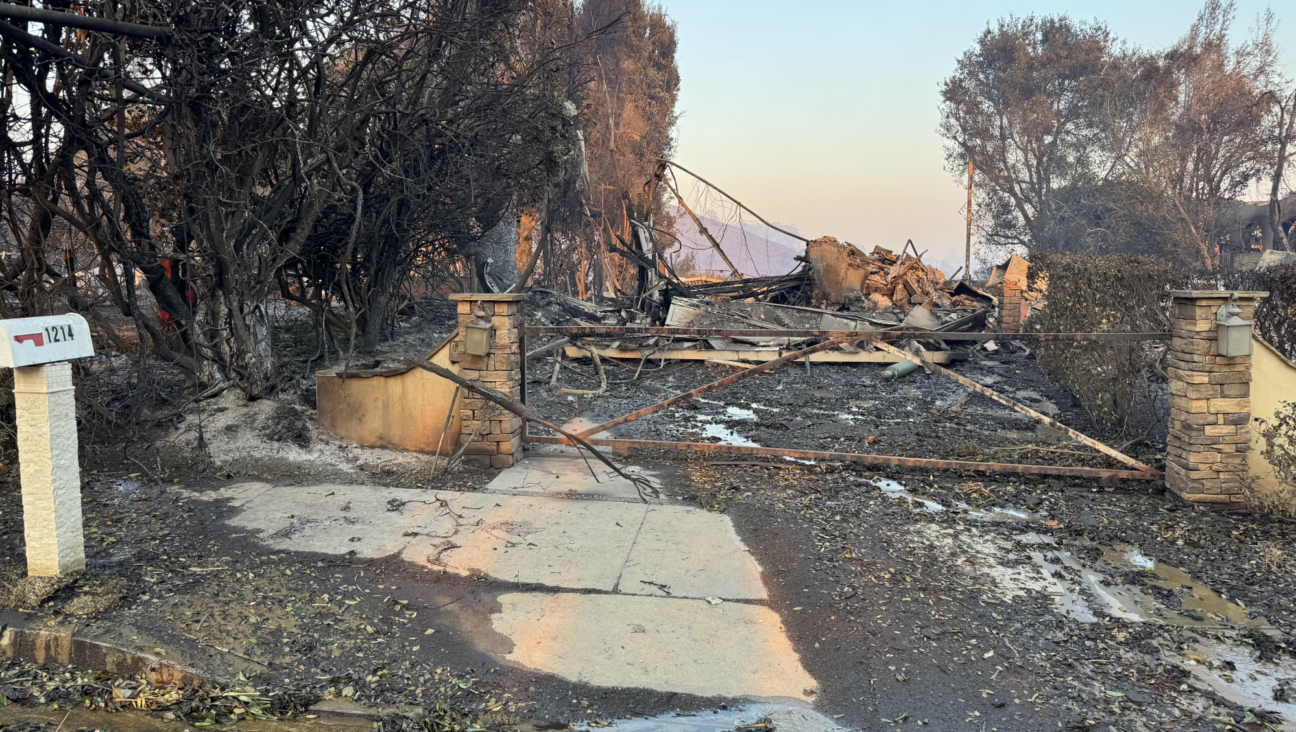In wartime Israel, everyone does their part — even if that means cooking dinner in a parking garage
Operating a little makeshift kitchen, the students at the Keshet school are feeding as many as 300 people per day

Students volunteer in their school’s parking garage, which also is functioning as a kitchen. Photo by Neil Weinberg
JERUSALEM — The Israeli war effort is also being waged inside the parking garage of the Keshet school in Jerusalem’s Katamon neighborhood.
Here, there are no weapons, only vegetable peelers and an oven that combines steam and heat. The foot soldiers are students, and their commander is Neil Weinberg, a 60-year-old chef who works at a restaurant in Ashkelon that closed after the Hamas terror attack on Oct. 7.
Instead of ammunition, there is chicken, ground meat, fish, vegetables and rice the students ordered with donated funds, plus the occasional bruised leftovers dropped off by a local restaurant or market wanting to help.
“Whatever there is, I put the menu together,” Weinberg said of the meals the troops are turning out for deployed soldiers, kibbutz evacuees, and others in need. “When the food gets to the Gaza Strip or wherever it goes, they send me pictures and videos saying ‘I cannot thank you enough, it’s tasty.’ It makes me feel like I’m doing something.”
The little makeshift kitchen, which has been feeding as many as 300 people a day since the war began, is one of myriad volunteer efforts across the Israeli homefront.

There are huge and high-profile projects like the Jerusalem Hamal, or Civilian Command Center, which has some 4,000 volunteers working in two shifts. Another 1,000 people are using their personal drones to help law enforcement, and thousands more are forming new neighborhood watch groups.
Raz Newman, an Israeli tech entrepreneur, began on the afternoon of Oct. 7 to build EzraBot, whose name is based on the Hebrew word for help and uses artificial intelligence to match people with need to those with means. Countless Israelis – and visiting Americans – are harvesting produce to on farms whose migrant workers left the country.
There are also tiny, ad-hoc operations everywhere. Like a friend in Jerusalem who is using the outdoor pizza oven he got as a 60th birthday gift to make as many as 20 pies each Wednesday evening for families in his synagogue who lost someone on Oct. 7 or has a soldier or reservist in battle.
The kitchen in Keshet’s garage falls somewhere in between.
It started during COVID, when some of the school’s seniors wanted to do something to help poor old people in the neighborhood. They prepared meals in the garage because the cafeteria was closed.
When the pandemic eased, they kept the operation going as a Tikkun Olam project, putting together 20 Shabbat packages each week. And when the war started, they ramped up. Rabbi Matan Hayat, a teacher at the school, said they have spent about 200,000 shekels — $54,000 — on supplies and equipment, including that oven and a new freezer, over the last eight weeks.
The kids call the operation “Kshishi” — a blend of “kashish,” a Hebrew word for old person, and “Yom Shishi,” Friday. Hayat said the students are in charge of buying the food, figuring out where to send it and finding delivery drivers
“They manage me, I don’t manage them,” he said. “It’s the only way we can make them work.”
I visited Kshishi on Thursday morning with half a dozen American rabbis who were on a three-day mission organized by the Shalom Hartman Institute. It was strange at first to see cutting boards lined up on tables next to parked cars, but we washed our hands and got to work peeling the largest sweet potatoes I’d ever seen and buckets full of carrots.
Students from a special ed class filtered in shortly after we arrived. Later, a group of juniors from Keshet’s advanced English class showed up. Chen Tamir, an 18-year-old senior whose brother is in the Army said it’s easier to concentrate in the kitchen than in class.
“It’s for ourselves,” she explained. “We have to feel like we’re helping. Every day they are fighting for us, and if we do nothing we feel meaningless.”

Hadas Gefen, whose son goes to the school, works arranging Jeep tours around the world for Israelis. Business went “from 100% to zero in one day,” she said, so she has spent the last weeks volunteering. Twice a week she works in the Jerusalem Hamal, coordinating transportation to bring soldiers to bases or evacuees from the south to doctor’s appointments. And on Thursdays, she’s at Kshishi.
“The first time, I chopped like 30 onions,” she recalled. “We have our stories of what we do every week. You write on Facebook, ‘Today I peeled and seeded 20 pomegranates,’ that was my war story. Everyone does what is comfortable to them.”
Weinberg, the chef, immigrated to Israel from South Africa in 1998. He evacuated his apartment in Ashkelon on Oct. 11, after several days of intense rocket fire from Gaza — he was eager to show me the photos on his phone of the explosions visible from his balcony and the rocket that fell right next to his building, where he walks the dog. He came to Jerusalem because he has a grown daughter living here, found Kshishi on Facebook and has been coming most days.
His specialty is Moroccan Fish — covering filets of tilapia, which is known here as amnon, with chili, garlic, cumin, coriander, paprika, tomato paste and crushed tomatoes, then roasting it with chickpeas, carrots and red peppers. On Thursday, I chopped a huge bunch of cilantro to garnish three hotel pans of the stuff.
There was also pasta bolognese, salads of grated carrot and purple and white cabbage, roasted potatoes and butternut squash. And rice.
“I change the rice,” Weinberg told me. “Sometimes there will be white rice, sometimes there will be yellow rice. Last week there were a lot of carrots, so I grated the carrots into the rice. I just make whatever comes into the mind.”
But this was the chef’s last day at Kshishi. The restaurant where he works, a Mediterranean bistro called Linda not far from Ashkelon’s waterfront, is reopening on Sunday, Dec. 3. He is not sure he’s ready — but he needs the paycheck.
“I don’t know what to expect,” he said. “When I get home, there could be shrapnel on my balcony.”
A message from our Publisher & CEO Rachel Fishman Feddersen

I hope you appreciated this article. Before you go, I’d like to ask you to please support the Forward’s award-winning, nonprofit journalism so that we can be prepared for whatever news 2025 brings.
At a time when other newsrooms are closing or cutting back, the Forward has removed its paywall and invested additional resources to report on the ground from Israel and around the U.S. on the impact of the war, rising antisemitism and polarized discourse.
Readers like you make it all possible. Support our work by becoming a Forward Member and connect with our journalism and your community.
— Rachel Fishman Feddersen, Publisher and CEO





























